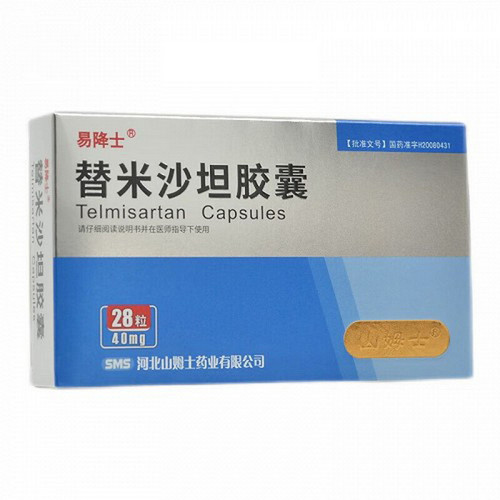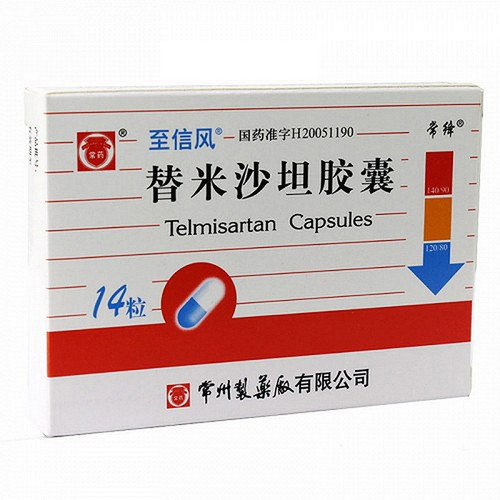Product Overview
[Drug Name]
Generic Name: Telmisartan Capsules
Trade Name: Kuihua Telmisartan Capsules 40mg*21 Capsules
Pinyin Full Code: KuiHuaTiMiShaTanJiaoNang 40mg*21Li
[Main Ingredient]
The main ingredient of this product is telmisartan, chemical name: 4-{2-n-propyl-4-methyl-6-(1-methylbenzimidazol-2-yl)-benzimidazol-1-yl)methyl]-diphenyl-2-carboxylic acid. Molecular Formula:
C33H30N402 Molecular Weight: 514.63
[Properties]
This product consists of white or off-white granules.
[Indications/Main Functions]
For the treatment of essential hypertension.
[Specifications]
40mg*21 Capsules
[Dosage and Administration]
Dosage for adults should be individualized. The usual initial dose is one 40mg capsule once daily. Telmisartan's antihypertensive efficacy is dose-dependent within a dose range of 20 to 80 mg. If optimal blood pressure is not achieved after treatment, the dose can be increased, up to a maximum of 80 mg (i.e., two 40 mg tablets or one 80 mg tablet) once daily. This product can be used in combination with thiazide diuretics, such as hydrochlorothiazide, which have a synergistic antihypertensive effect. Because telmisartan's maximum effect is not achieved until four to eight weeks after the start of treatment, this consideration should be taken when increasing the dose. Patients with Renal Impairment: No dose adjustment is required for patients with mild or moderate renal impairment. Telmisartan is not eliminated through hemofiltration. Patients with Hepatic Impairment: The daily dose of this product should not exceed 40 mg. No dose adjustment is required for the elderly. Safety and efficacy data for children and adolescents under 18 years of age have not been established.
[Adverse Reactions]
In placebo-controlled trials, the overall incidence of adverse events with telmisartan (41.4%) was similar to that with placebo (43.9%). The incidence of adverse events was not dose-related or associated with gender, age, or race. The following adverse reactions are cumulatively reported in 5,788 hypertensive patients treated with telmisartan in clinical trials. Adverse reactions are classified by frequency as follows: very common (>1/10); common (>1/100, <1/10); uncommon (>1/1000, <1/100); rare (>1/10000, <1/1000); very rare (<1/10000) Systemic reactions: Common: back pain (such as sciatica), chest pain, flu-like symptoms, infection symptoms (such as urinary tract infection including cystitis) Uncommon: abnormal vision, sweating Rare: hypoglycemia (rarely in diabetic patients); Rare: angioedema (with fatal consequences); Rare: pain in the extremities (leg pain). Central and Peripheral Nervous System: Common: Dizziness. Gastrointestinal System: Common: Abdominal pain, diarrhea, dyspepsia, gastrointestinal disturbances. Rare: Dry mouth, flatulence. Musculoskeletal System: Common: Arthralgia, leg cramps or pain, myalgia. Rare: Tenosynovitis-like symptoms. Psychiatric System: Rare: Anxiety. Respiratory System: Common: Upper respiratory tract infection, including pharyngitis and rhinitis. Skin and Adnexal System: Common: Skin abnormalities, such as eczema. Additionally, since the marketing of telmisartan, isolated case reports have included erythema, pruritus, syncope, insomnia, depression, stomach discomfort, vomiting, hypotension, bradycardia, tachycardia, dyspnea, eosinophilia, thrombocytopenia, weakness, and decreased work efficiency. Similar to other angiotensin II antagonists, rare cases have reported angioedema, urticaria, and other related adverse reactions. Laboratory Findings: Compared to placebo, decreased hemoglobin or increased uric acid were occasionally observed in the telmisartan treatment group. Telmisartan and placebo had similar or lower rates of elevation in serum creatinine or liver enzymes. Sepsis, including fatal outcomes, was not clearly defined [1] [1] Telmisartan increased the incidence of sepsis compared with placebo in the profess study. This may be a chance result or may be related to an unknown mechanism.
[Contraindications]
◆ Patients who are allergic to the active ingredient of this product or any of the excipients ◆ Pregnant women in their second or third trimesters and breastfeeding women ◆ Patients with biliary obstructive disease ◆ Patients with severe hepatic insufficiency ◆ Patients with severe renal insufficiency (creatinine clearance <30 ml/min)
[Precautions]
Hepatic insufficiency This product should not be used in patients with cholestasis, biliary obstructive disease or severe hepatic dysfunction because most of telmisartan is excreted in the bile and these patients may have reduced clearance of this product. This product should be used with caution in patients with mild to moderate hepatic insufficiency. Diabetic patients: Patients with diabetes and additional cardiovascular risk factors, such as those with coronary artery disease (CAD), may be at increased risk of fatal myocardial infarction and unexpected cardiovascular death when using antihypertensive drugs such as angiotensin receptor blockers or ACE inhibitors. Patients with diabetes and CAD may be asymptomatic and undiagnosed. Therefore, before using this product, diabetic patients should undergo appropriate diagnostic evaluation, such as exercise compliance testing, to identify CAD and initiate appropriate treatment. Renovascular hypertension: In cases of bilateral renal artery stenosis or stenosis of the artery of a single functioning kidney, the risk of severe hypotension and renal insufficiency is increased with the use of drugs that affect the renin-angiotensin-aldosterone system. Renal Insufficiency and Renal Transplant Patients: This product should not be used in patients with severe renal insufficiency (creatinine clearance <30 ml/min; see Contraindications). For patients with renal insufficiency, serum potassium and creatinine levels should be monitored regularly during use of this product. No data are available regarding the use of this product in patients shortly after a recent renal transplant. Patients with Volume Depletion: Administration of this medication, particularly after the first dose, may cause symptomatic hypotension in patients with volume depletion or hyponatremia due to strong diuretic therapy, salt restriction, nausea, or vomiting. Therefore, serum sodium and volume levels should be corrected before using this medication. Other Conditions Associated with Stimulation of the Renin-Angiotensin-Aldosterone System: In patients whose vascular tone and renal function depend primarily on the activity of the renin-angiotensin-aldosterone system (e.g., those with severe congestive heart failure or underlying renal disease, including renal artery stenosis), the use of medications that affect this system may cause acute hypotension, hyperazotemia, oliguria, or, rarely, acute renal failure. Antihypertensive drugs that inhibit the renin-angiotensin-aldosterone system are generally ineffective in patients with primary aldosteronism, and therefore this medication is not recommended for use in these patients. This product should be used with caution in patients with aortic or mitral stenosis or obstructive hypertrophic cardiomyopathy, as with other vasodilators. Electrolyte Imbalance: Hyperkalemia may occur with the use of medications that affect the renin-angiotensin-aldosterone system, particularly in patients with renal impairment and/or heart failure, and in patients with diabetes. However, for patients at risk, serum potassium levels should be closely monitored during use of this product. Based on experience with other medications that affect the renin-angiotensin system, this product can increase serum potassium levels when used with potassium-sparing diuretics, potassium supplements, potassium-containing salt substitutes, or other medications that increase serum potassium levels (such as heparin). Therefore, caution should be exercised when using this product with this product (see Drug Interactions). Each 40 mg capsule of this product contains 169 mg of sorbitol. Therefore, this product should not be used by patients with hereditary fructose intolerance. Similar to ACE inhibitors, the antihypertensive effect of this medication and other angiotensin antagonists is lower in blacks than in other ethnic groups. This may be related to the higher prevalence of low renin status in hypertensive individuals in blacks. As with other antihypertensive medications, excessive blood pressure reduction can cause myocardial infarction or stroke in patients with ischemic heart disease or ischemic cardiovascular disease. Effects on driving and operating machinery: This medication has not been studied; however, caution is advised when driving or operating machinery.
Antihypertensive treatment can sometimes cause dizziness and drowsiness.







